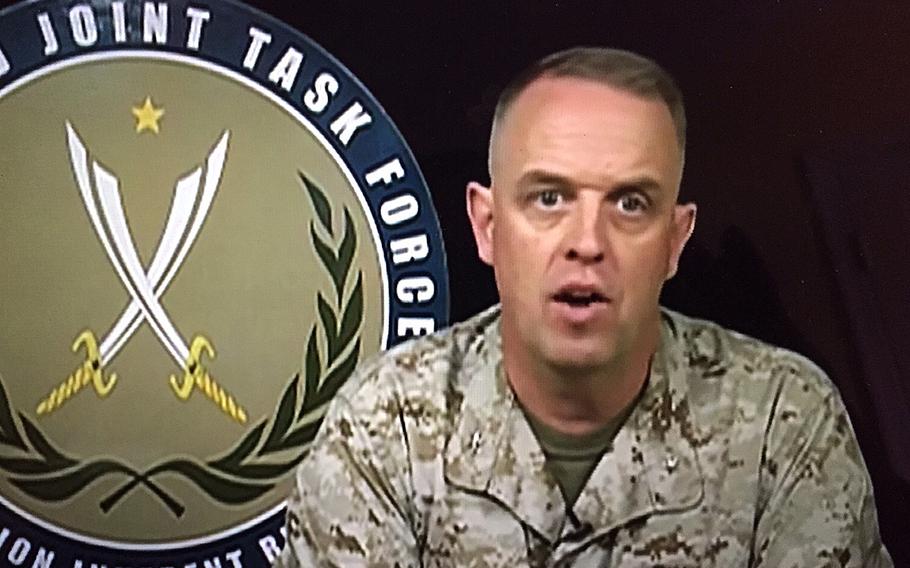
A video screen grab shows Marine Corps Brig. Gen. Kevin J. Killea, chief of staff of Combined Joint Task Force-Operation Inherent Resolve, as seen during an Aug. 21, 2015, video teleconference at the Pentagon where he spoke of operations against Islamic State militants. During a Friday, Sept. 4, 2015, video teleconference at the Pentagon, Killea reported progress against IS in northern Iraq, but acknowledged slow going around Ramadi. (Defense Department)
WASHINGTON — Kurdish fighters backed by U.S.-led coalition airstrikes have made “significant” advances against the Islamic State near Tuz Khormato in northern Iraq as the effort to reclaim the western city of Ramadi is moving slowly, a U.S. general said Friday.
Kurdish peshmerga fighters in the Tuz Khormato area have been pushing back Islamic State fighters, “denying them terrain and causing them to make some hard operational decisions,” Marine Corps Brig. Gen. Kevin J. Killea, chief of staff of the Combined Joint Task Force-Operation Inherent Resolve told reporters during a video conference at the Pentagon.
“Their actions demonstrate once again that territory can be retaken from ISIL,” he said, using one of several acronyms for the Islamic State. “Reducing their ability to control seized areas for significant portions of time, and thereby degrading establishment of any level of governance.”
The peshmerga fighter’s success in northern Iraq is especially important, Killea said, because it helps cut some of the routes that allow the Islamic State to communicate and resupply in contested regions farther south and west. That could help Iraqi forces recapture Beiji, an oil refinery city about 130 miles north of Baghdad. Fighting there has been a “hotly contested” back-and-forth battle. Killea said
Tuz Khormato is an ethnically mixed city of Turkmen, Kurds and Arabs located about 120 miles northeast of Baghdad in Salaheddin province. The large number of non-Arabs makes it more difficult for the Islamic State to operate there than in areas such as Anbar province that are heavily Sunni Arab.
Farther south and west in the Sunni heartland, Killea said Iraqi Security Forces’ efforts to recapture Ramadi, the capital of Anbar, remain in the “isolation phase,” meaning a first stage attempt to surround the city and isolate it from the rest of the heavily Sunni province.
The Washington Post quoted the Iraqi head of the Anbar Operations Command, Maj. Gen. Qasim al-Mohammadi, as saying the operation was moving slowly because “there are not enough airstrikes from the coalition to clear targets on the ground.”
The newspaper quoted an unidentified U.S. official as saying the effort around Ramadi had been slowed because of several factors, including severe heat and extensive fortifications and booby-traps that militants have planted around the city, which fell to the militants in May.
Iraqi Prime Minister Haider Abadi told the BBC in May that Ramadi would be retaken “in days.”
Killea said the Islamic State has primarily used improvised explosive devices and vehicle borne-IEDs to slow the ISF advances. The bombs have been the leading cause of ISF casualties in recent months, forcing the U.S. to respond by providing additional equipment, including bulldozers, mine-clearing gear, and anti-armor weapons, to destroy them.
“Anti-armor weapons are proving to be a huge plus for (the ISF) with regards to identifying (vehicle bombs) and destroying them before they become a factor,” Killea said.
While the pace of advance on Ramadi remains slow, Killea said the U.S. does not see it as “stalled or delayed.” He said the coalition has launched about 16 airstrikes against Islamic State positions around Ramadi just this week.
“We are on the government of Iraq’s timeline for when they feel they have set the conditions properly to go to the next phase and clear Ramadi,” Killea said.
Soon more Iraqi fighters should be prepared to battle Islamic State forces, Killea said, as the U.S. continues to train and equip the ISF.
Within the next week soldiers in the Iraqi Army’s 75th Security Brigade should be issued weapons and equipment and begin a two-week training block on the use and maintenance of those systems, the general said. The 75 th will mark the fifth Iraqi brigade considered fully trained.
“We fully expect that this training will give the 75th the necessary level of tactical proficiency to provide the Iraqi army an overall greater level of confidence for operational capabilities,” Killea said.
dickstein.corey@stripes.com Twitter: @CDicksteinDC